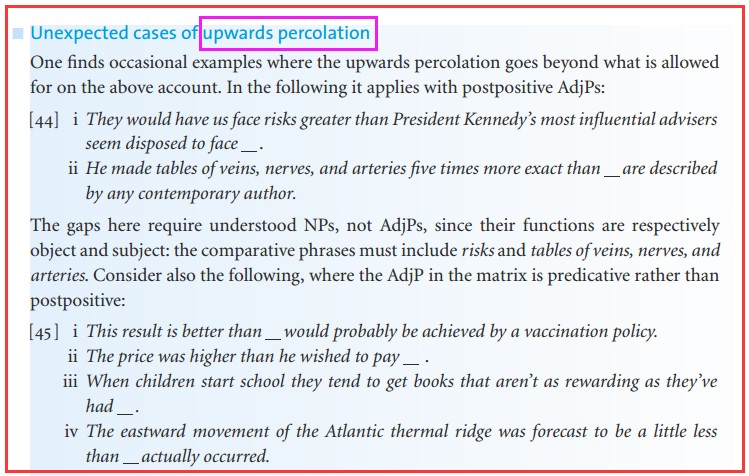在前面一个网友的提问中,网友引用了《剑桥英语语法》第1122页的一个句子,但我在上面发现的 upwards percolation 仿佛也不对啊?这里为何用副词 upwards 作定语呢?难道不应该是要用形容词 upward 吗?
原问题见:https://www.cpsenglish.com/question/57346
第三截图如下:

没想到大伙对这个问题感兴趣,买椟还珠!从历史的角度就能理解这个问题。其实两种说法都对,大伙可以搜索一下这本剑桥语法,两种写法都有。用upwards percolation就是副词修饰名词(某些地址副词修饰名词置于名词前),当然,副词后置于名词的要多见一些(five dollars upwards)。
我觉得很大可能是早期英语的残留,对不对反正就这么用了,遗留到今天。譬如目前还在用的in an upwards direction这个短语,你可以说是把副词当形容词在用,这找哪个说理去?
在Heaton的著作“Overseas students companion to English studies”第333页如此写道:
Originally the suffix ward seems to have been common when the word to which it was added was used
adjectivally: thus a sideward movement, a downward glance; wards is commonly used adverbially: thus to move sidewards , to glance downwards.
However, most English writers rarely distinguish between the two nowadays, and it is correct to write either an upward direction or an upwards direction, travel southwards or travel southward.
在“Collins COBUILD English Usage2019第4版”中有如此一段话:
12 modifier use
Some place adverbs can be used in front of nouns as modifiers.
Gradually the underground caverns fill up with deposits.
There will be some variations in your heart rate as you encounter uphill stretches or increase your pace on downhill sections.
或许有人会说这里的underground和uphill,downhill都是形容词(见朗文高阶第五版),如何是副词呢?缘由也非常简单,假如你手上有比较早期的词典,譬如Hornby撰写的牛津当代第三版1974年的,当时的downhill就只有副词这一个类别。这也为语言的演变提供了一个证据,也正由于这样,当代的词典就把作形容词的类别加上了。大家用当代的见地去看待过往,必然会出现不少看上去奇怪其实也并不特别的问题。
用upward percolation形容词修饰名词,更符合当代的语法认知。



